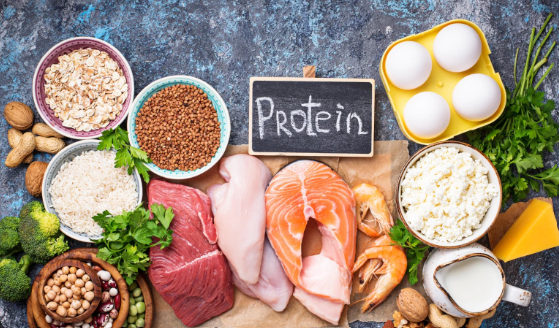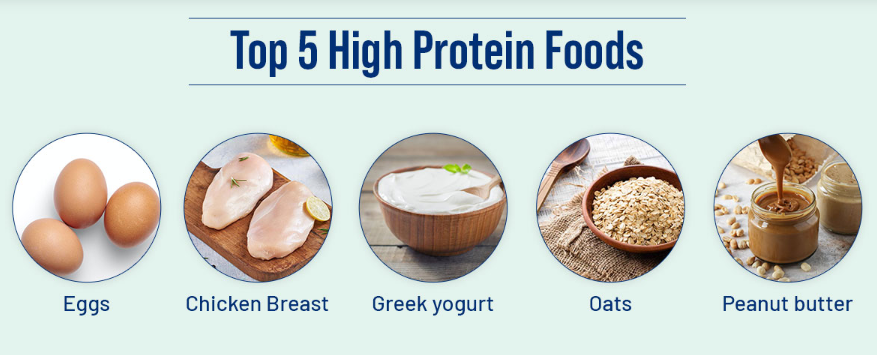
Proteins power: Ensure you are Meeting Your Daily Nutritional Requirements
Table of Contents
ToggleProteins are the building blocks of life
playing a crucial role in various bodily functions, from cell repair and immune system support to muscle development. Despite their significance, many individuals may not be aware of whether they are getting an adequate amount of proteins each day. This article explores the importance of protein intake, signs of protein deficiency, and practical tips to ensure you’re meeting your daily nutritional needs.

Understanding Protein’s Role:
Proteins are macronutrients composed of amino acids, essential for the proper functioning of our bodies. They contribute to the creation and repair of tissues, the production of enzymes and hormones, and play a vital role in maintaining a strong immune system. Adequate protein intake is especially crucial for those engaged in physical activities, as it aids in muscle recovery and growth.
Signs of Protein Deficiency:
Not consuming enough protein can lead to various health issues. Recognizing the signs of protein deficiency is essential for making necessary dietary adjustments. Some common indicators include:
- Muscle Weakness and Wasting: Protein is vital for muscle health. Weakness, atrophy, or a general decline in muscle mass may signify insufficient protein intake.
- Hair, Skin, and Nail Problems: A deficiency in protein can manifest in the form of brittle hair, skin issues, and slow nail growth. These symptoms reflect the role of proteins in supporting the health of these external tissues.
- Fatigue and Weakness: Protein is an energy source, and inadequate intake may result in fatigue, weakness, and a lack of stamina.
- Increased Susceptibility to Infections: Proteins contribute to the formation of antibodies and support immune function. A weakened immune system may be a sign of insufficient protein in the diet.
Ensuring Adequate Protein Intake:
Meeting your daily protein requirements doesn’t have to be a complex task. Here are some practical tips to ensure you get the protein your body needs:

- Include Protein-Rich Foods: Incorporate a variety of protein-rich foods into your meals. Sources such as lean meats, poultry, fish, eggs, dairy products, legumes, nuts, and seeds are excellent choices.
- Balance Your Meals: Distribute your protein intake evenly across meals. This ensures a steady supply of amino acids throughout the day, supporting various bodily functions.
- Consider Protein Supplements: For individuals with specific dietary restrictions or those struggling to meet their protein needs through food.
-
Protein Quality Matters:
It’s not just about the quantity; the quality of the proteins you consume also plays a significant role. Proteins from animal sources are considered complete proteins, containing all essential amino acids that the body cannot produce on its own. If you follow a vegetarian or vegan diet, combining various plant-based protein sources can help ensure you receive a full spectrum of amino acids.
Adjusting Protein Intake for Your Goals:
The optimal amount of protein varies based on factors such as age, sex, weight, physical activity level, and overall health goals. Athletes or those engaged in rigorous physical activities may require higher protein intake to support muscle recovery and performance. Consulting with a nutritionist or fitness professional can help tailor your protein consumption to meet your specific needs.
The timing of protein intake can also impact its effectiveness. Consuming protein-rich meals or snacks throughout the day, especially after workouts, can maximize muscle protein synthesis. Including a protein source in your post-exercise nutrition can aid in muscle repair and growth.
Protein and Weight Management:
Proteins contribute to a feeling of satiety, which can be beneficial for weight management. Including adequate protein in your diet may help control appetite and prevent overeating. However, it’s essential to strike a balance and not rely solely on protein for weight loss, as a well-rounded diet is crucial for overall health.
Monitoring Your Dietary Habits:
Keeping a food diary or using nutrition apps can help you track your protein intake and ensure you meet your daily requirements. It also provides valuable insights into your overall dietary habits, enabling you to make informed decisions about your nutrition.
Special Considerations:
Certain life stages, such as pregnancy, lactation, or recovery from illness or surgery, may require adjustments to your protein intake. In these cases, seeking guidance from healthcare professionals or registered dietitians is essential to address specific needs.
Proteins are indispensable for maintaining a healthy and functioning body. Ensuring you get the right amount and quality of protein each day is a proactive step toward overall well-being. Whether you’re an athlete aiming for peak performance, someone focused on weight management, or simply looking to lead a healthy lifestyle, paying attention to your protein intake can make a significant difference. By understanding your nutritional needs, making mindful food choices, and seeking professional advice when needed, you can harness the benefits of protein to support a vibrant and active life. Remember, your journey to optimal protein intake is a personal one, and small, sustainable changes can lead to lasting health improvements.
For the latest updates-click here.


